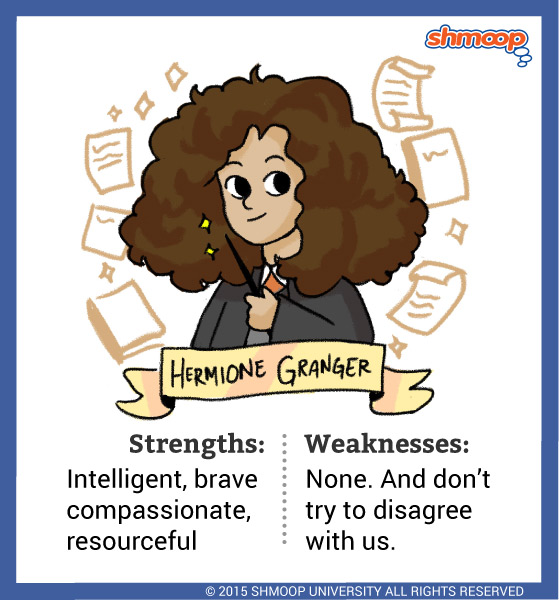Character Analysis

(Click the character infographic to download.)
When we first meet Hermione, Harry and Ron think she's super annoying. She's loud and bossy and butts in all the time. She's your typical know-it-all, does-her-homework-perfectly-all-the-time, and always-follows-rules kind of girl. Hermione puts lots of people off by working so hard and being so smart. But she's not just a suck-up – we can tell that she's genuinely excited about learning magic and has an incredibly strong work ethic. To other students, though, it can seem like she's trying too hard. Ron and Harry even hope she won't be in Gryffindor with them – at least Ron hopes that she won't. He tells Harry, "Whatever house I'm in, I hope she's not in it" (6.223). Sure enough, Hermione becomes a Gryffindor, and it takes quite a while for them all to become friends. When they do, though, it sticks like peanut butter and jelly.
At eleven, Hermione has frizzy brown hair and buckteeth, and is more invested in learning wizarding history and Transfiguration charms than she is in putting on lipstick. Fair enough – she's not a teenager yet. Hermione always knows all the answers to the teachers' questions. It's a good thing, though. Her attention in class and her study skills help her save lives: she rescues Ron and Harry from the Devil's Snare and helps Harry figure out which potion to drink in the room of fire. She's the first one in their class to successfully Transfigure something, and she's also the first one to make feathers fly. Her brains serve the Gryffindor house well.
It's a little surprising that Hermione, who everyone thinks is the brainiest first year, isn't in Ravenclaw with the other brainiacs. But soon we find out that Gryffindor suits her well, because her bravery is as great as her intelligence. She's also loyal – consider the incident with the troll in the girls' bathroom. She defends Ron and Harry after they save her, even after Ron made fun of her. Remember what she tells Harry as he goes to rescue the Stone:
"Books! And cleverness! There are more important things – friendship and bravery and – oh Harry – be careful!" (16.288-89)
She tells Harry that friendship and courage are "more important" than knowledge and studying. We're not trying to say that education isn't important, and we don't think Hermione is either. But she reminds us of how knowledge connects to those other, important parts of life. Hermione shows us how the ability to learn really is a key to friendship and bravery.By making Hermione one of the bravest and cleverest wizards of her year, Rowling sends a strong message about discrimination. According to Malfoy and some Slytherins, wizards who don't inherit their powers from wizarding families are seen as inferior. Because Hermione is from an entirely Muggle family, she shouldn't be that good at magic, or even be allowed to do magic, according to their standards. The fact that she's so great at magic proves wizard talent doesn't always come from genetics, and also shows how narrow-minded this idea of pureblood wizardry is.

(Click the infographic to download.)